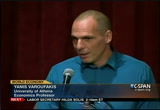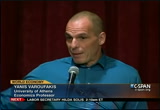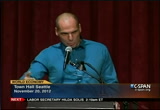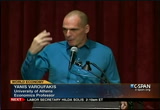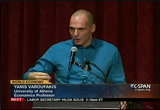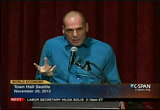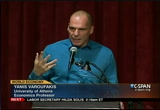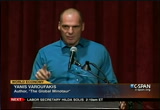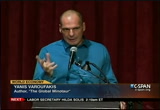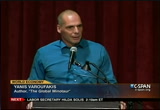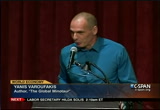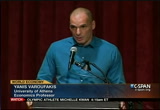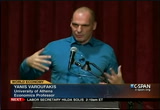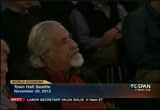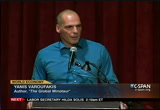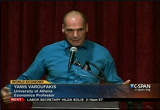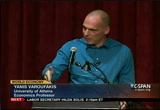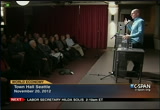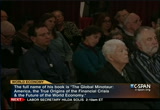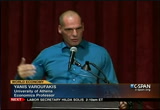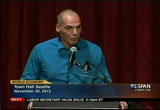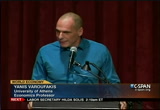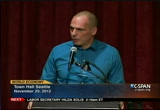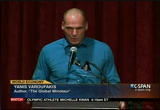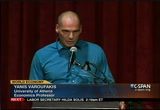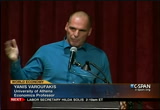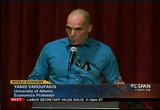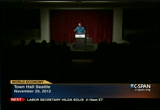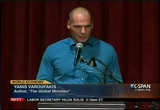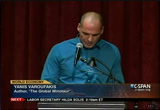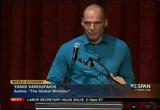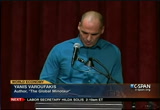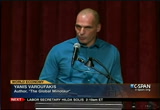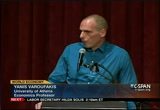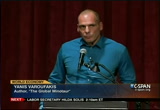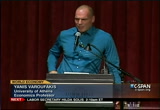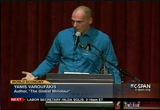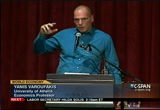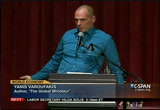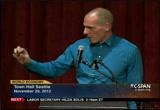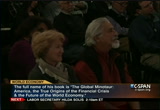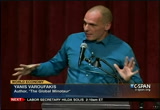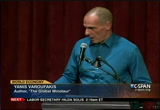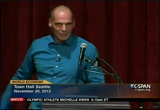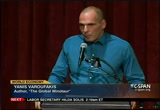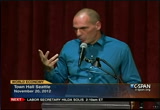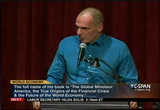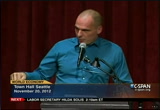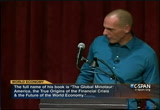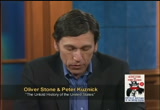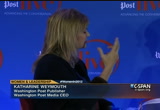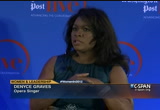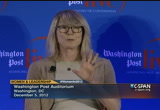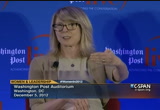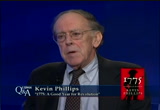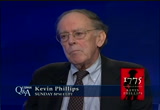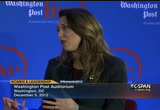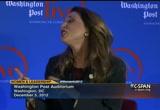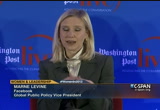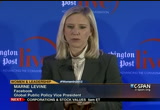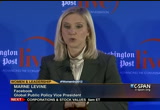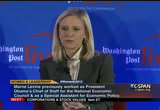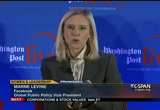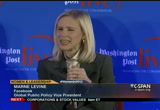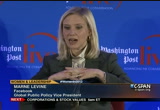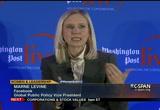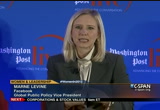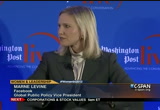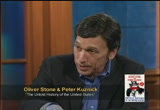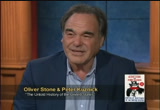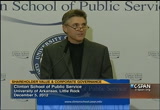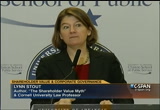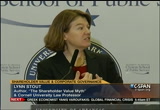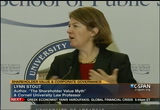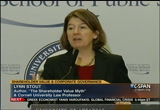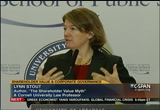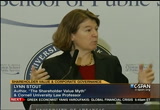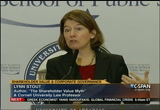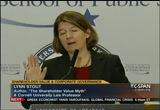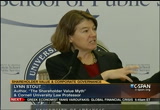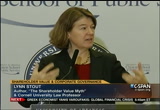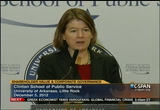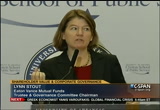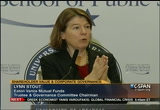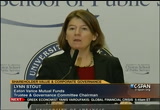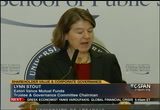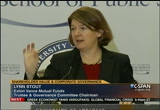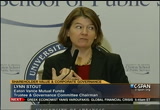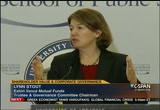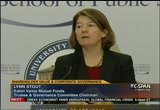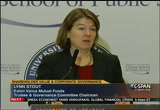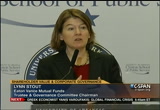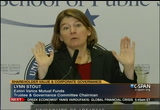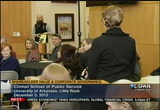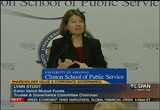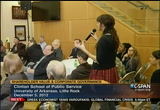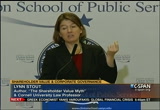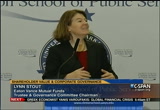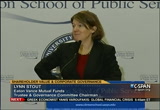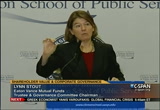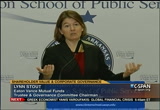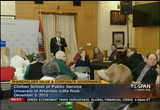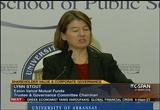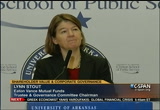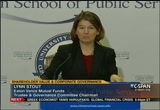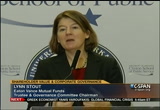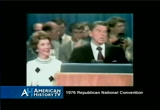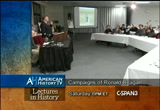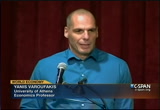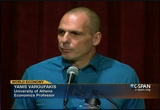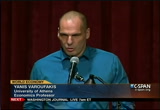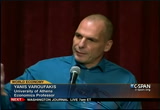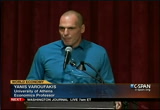tv Capitol Hill Hearings CSPAN December 27, 2012 1:00am-6:00am EST
1:00 am
my god, a debt crisis. then there is another peak behind it that is often not seen, overshadowed. but it's just as tall. it is 8 peak of huge, gigantic and savings with no place to go. the world we live in has the highest ratio of savings. -- in the history of capitalism. we have accumulated profit and savings would know where to go, -- with nowhere to go, too fearful to be invested in productive uses, simply because of the crisis. this is the twin peaks, have been referring to. when i say there is no debt crisis, i don't mean there is no
1:01 am
debt. the debt is a huge problem just like a cancer patient has a problem with pain. but it isn't healthy to be -- but it is analytically unhelpful to be thinking in terms of the debt crisis. we might as well refer to the crisis we are going through as the savings crisis, a crisis caused by too much savings. you have never heard anyone from bloomberg refer to it as a crisis of a glut of money with nowhere to go, but it is, just as much as it is a crisis of debt. let's begin at the beginning. let's talk about debt. reading the mainstream outlets, newspapers, or listening to the idiotic stations like fox, hyou would think that it is possible to have capitalism without debt. recall of feudalism.
1:02 am
-- well, it isn't. once, it was possible to have an economy with debt that is marginal. recall feudalism. what was the process that led to the accumulation of wealth? it began with production. peasants work on the land. they produce wheat, corn, so production came first. then came distribution. that would come in and take a large part of that mountain of corn for distribution between the peasantry and the gentry. eventually, you had financialization. the landlord would sell in the rudimentary, marginal market, his surplus.
1:03 am
and with the money, indulge in some money lending. so you had production, distribution, and financialization. and debt creation. but financialization came at the end and was not essential for production and distribution. with capitalism, what you had was the perfect reversal of the process. so how is capitalism different than feudalism? once the peasants were thrown off the land, they became landless peasants. some were kept by the landlord and they were involved with sheep and wool. -- kept by the landlord and given the task to organize
1:04 am
production. usually, that was involved with sheep and wool. it became an international commodity. it could be exchanged for silk in india and the silk exchanged for swords in japan, and those swords would be sold back in england and the whole thing would start again. so the ex-peasant who is now running the show on a small plot of land handed over to him by the landlord would be an entrepreneur. effectively, he borrowed money from the landlord in order to pay for things, and pitiful -- pay for three things. rent of the land, wages in the form of corn, to the ex-peasants who are now wandering in the countryside knocking on doors because they don't have direct access to land.
1:05 am
and some machinery, shears for clipping wool. so land, labor, and capital, could be purchased in advance of production, on the basis that the entrepreneur, ex-peasant has to the landlord. so debt comes first, then comes distribution of income in the form of a labor contract. it will work for so many hours and i will give you so much corn. then comes production. it was a combination of this reversal of the order from having production followed by a distribution, followed by debt, to having debt first, then distribution, then production. in conjunction with the great improvements in technology that unleashed the powers of capitalism, and capitalism manage to produce immense wealth. something unpleasant but -- and
1:06 am
at the same time produce poverty that had never been known before. the debt is to capitalism what hell is to christianity. unpleasant, but absolutely necessary. in a sense, capitalism is about ecological economics, even though capitalists don't want to hear this. it is about recycling. we had heard of the term by the 1970's, especially about the green movement in europe. capitalism has always been recycling. the process of described is a process whereby the entrepreneur is now forced to be an entrepreneur. the ex-peasants, they did not choose to be entrepreneurs. they had to be.
1:07 am
they used debt. bringing it to the present, energizing the production process, producing the wealth from which he hopes that he will be able to repay the debt. the moneylenders, later the bankers. cover for the fact that he had paid wages for capital goods. hoping there is something left for him, for profit. debt is all about intertemporal recycling. by effectively taking his hand and pushing it into the future, grabbing value that had not been generated. -- that is debt. producing the wealth, from which they hoped they would pay the debt. moneylenders, bankers.
1:08 am
covering the fact that he had already paid wages, hoping that there would be something less for -- left for him. the fact that there is recycling -- you take a value for the future, bring it into the present, so as to develop -- delivered the body to the future. the problem with this process is once you start it and it works, you make a lot of money out of its. and history suddenly starts being measured in terms of years instead of decades or centuries, because of what capitalism did. it accelerates through technology and weaponization. -- technology and wealth accumulation. it is like a machine to produce money. so, you want to use it more and more faster. the trouble is, if you overreach and take too much value from the future, you will create too much debt at some point. he will not be able to generate enough volume to deliver to the future. your recycling breaks down. there is the second problem, still -- too. the places and the regions and sectors in which this dynamic capitalist process pushes the boundaries of technology to create wealth, those are the servant riches.
1:09 am
-- surplus riches. it started in manchester, in am sterdam. it is always localized. there will always be defecit regions and surplus regions. so, manchester northern england was in surplus back then. southern england was in debt. now is the obvious. -- it is the opposite. similarly, you have new york state in surplus, washington state in certification plus. -- in surplus. illinois, the dakotas in debt. missouri is your equivalent of in greece, a permanent bailout. the thing is, whereas markets are an easing institutions for -- are amazing institutions for allocating existing goods and services among consumers, they are chronically bad at creating
1:10 am
a surplus between deficit -- at creating a balance between deficit and surplus regions. a geographic problem, and intertemporal. remember -- if that comes first, suddenly the money lender who later becomes a banker who later becomes wall street plays a hugely significant role in this process. the banker is the conduct of that -- conduit of that recycling mechanism. when they get an increase in proportion as the result of their mediation of that process. given that, a failure of the banker is the same thing as -- is not the same thing as the failure of a clothes maker.
1:11 am
suddenly, there are two things that must have been. -- happen. 1 -- society will demand that banks are not allowed to go to the wall. then bankers are affectively given carte blanche, free money for themselves. and the whole mechanism breaks down in 2008. -- like in 2008. it is often said in the eurozone, we made a huge error in europe of binding together these economies. -- disparate economies by means of common currency. this is not the first time these things that happened. it happened in the united states of america. you have disparate economies in the united states of america that are bound together monetarily. missouri and washington state are as different as germany and greece. what is it that keeps the united states together? you had a great expression in the 1930 -- you had a great depression here in the 1930's. things were awful. and yet, i do not believe there
1:12 am
were any political movements to get rid of the deficit states from the united states, like there are in europe and portugal and spain and everywhere else that happens to be in deficit. the reason is, the federal- state, especially after 1929 plays the role of the regulator of surplus and deficit recycling around the land. let me give you a simple example. we are in seattle. boeing is sponsoring the lectures. when boeing goes to washington to give a contract for the next generation jet or whatever, they may get it. they do get it. but there are some things attached. like for instance, we want a factory that builds the wings are the engines in tennessee or missouri or arizona.
1:13 am
in the deficit regions. this is not philanthropy. this is an act of recycling surplus so the surpluses of the surplus state can continue to be created, produced. you may recall that in the 1920s, internationally, we had a gold standard. fixed exchange rates. it is like having a single economy. that gold standard creates a a degree of growth, together with the emergence of state corporations like edison that allows the bankers to run riot, to bring value to the peasant and to recycle. and that is what led to the collapse of 1939, which was that generation's version of 2008.
1:14 am
when that collapse happened, what you had was unsustainable debts coming irresponsible banking -- unsustainable that's, irresponsible banking. you had the collapse of the currency. it is what we have not now in greece, exactly the same. the generation that came to power in 1932 were exceptionally fearful of what would happen to the united states of america after 1944. because they very much feared that after the stimulus went through, after the stimulus of the second world war was over with the emergence of peace, the great depression would come back. they have learned their lessons from the gold standard here. and they did that. -- did what?
1:15 am
bay reconstituted, they reintroduced -- eight reconstituted, they reintroduced a system of global exchange. it was the bretton woods system. the dollar was the lynchpin. all the countries around the world were locked at this specific exchange rate into the dollar. but it would not repeat the error of the 1920's adjust binding together the economies of the world without having a mechanism to recycle surplus is around the world, but because it was that lack of a mechanism that brought about the disaster of the 1930's. those in power in washington in 1944 onwards were aware of the need for the surplus mechanism. interestingly, in new hampshire in 1944, there was a big clash between people in the united states, and the british influence -- someone you may
1:16 am
have heard of, john maynard keynes, the famous economist. both agreed that the local system of fixed exchange rates -- global system of fixed exchange rates had to come with what was missing in the 1920's. and what was that? it was the global surplus recycling mechanism. but they disagreed on what one should look like. keynes represented the declining empire. the weakened, previously the dominant country recommended a multilateral policy. a world bank. full representation. different countries on its. it as andd to
1:17 am
international clearing union, what i referred to as a global surplus for cycling mechanism. and we should all agree. but the united states said, no, mate. dollar surpluses, you cannot have any. none of you have any. you are all covered in ashes. the only accredited nation on the surface of the planet is the united states of america. i agree we have surpluses. we will recycle precisely the way that we choose and we are not going to start this recycling mechanism into a kind of united nations. it is indeed the case that from 1949 until 1960 onwards, the united states of america recycle 70% of its surpluses to germany and japan. an astonishing number. 70% of the profits in the country were recycled into europe and japan. the marshall plan is a very small target.
1:18 am
-- small part of it. i will not bore you with details. but it was not an act of philanthropy. when they go to washington, it is not a philanthropic act on the pentagon's part. -- to instruct boeing to build . it is pragmatic. the united states federal government -- unless europe is dollar rise, unless they do not have dollars to spend purchasing the net exports of those who have surpluses, then they will stop having surplus. this is the surplus recycling mechanism. thus, we have the 20 years of the golden age. 60's.950's and the 19
1:19 am
a period of immense stability very low inflation. universal growth. we had other problems. the lease from the macroeconomic point of view, it was a golden age. why is that? -- why did it end? because the global surplus of recycling mechanism was sustained. -- could no longer be sustained. why? because the united states stopped having a surplus by the end of the 1960's. how can you recycle surplus if you cannot have it. enter a young turk in 1971. well, paul volcker -- been named may ring a bell. in 1971, paul volcker was an unknown working for another american. henry kissinger, who you may have heard of. before he became secretary of state. he was still national security
1:20 am
advisor. volcker's paper, which are when i read a few years ago, i thought it was the most remarkable document ever to emerge from washington in the last few years. -- last 50 years, 60 years. asked a simple question. is losingmerica its surplus, looking at the emerging economies of the world -- primarily germany and japan at the time -- how will be paid back germany? -- how will we retain our hegemony? he said we could not recycle our own surpluses. we must recycle other people's surpluses. and this is what happened between the mid-1970's and 1978. -- and 2008. the u.s. utilizing its trade deficit with the rest of the world has been operating like a huge vacuum cleaner. sucking into the united states
1:21 am
the net exports of europe, japan, and lately china. thus providing exporters -- germany, japan, or china -- with the requisite demand necessary. so, the ever expanding trade deficit was not an accident. it was a very clever way of replacing one that surplus recycling system with another. the first one, it was one where america had a surplus and america decided instead of doing what germany is doing at the moment -- which is cutting its nose to spite its face, and thereby ending the -- entering recession by cutting, cutting, cutting -- volcker as the head of the fed at a different idea. we are going to expand our dominance and are well by -- and
1:22 am
our wealth by expanding our deficit and using our deficits to provide the rest of the world with the demand which is necessary to grow their economies, even at the expense of hours. -- ours. and who is going to pay for the deficit? if i have an ever-expanding deficit, the bank tells me it is came over. -- game over. but if you are the united states of america and there are certain -- and you have the reserve currency of the world, and certain other factors that i will touch upon later, what you can do is you can expand your deficit as long as you create the circumstances so that german entrepreneurs, later chinese, take their profit, which they earned and they send it to wall street. thus closing the cycle, the
1:23 am
recycling loop. so, effectively what we have between 1940's and 1971, 1973, you had global surpluses being recycled from united states to the rest of the world. the capitalist world. the western world. ok? so, the united states was an exporter to europe and japan. it was making profits. it was then recycling to europe and japan. so they would keep on buying. once the surplus shifted to japan, germany, and china, the idea that volcker had was a we will swap this. we will just turn it on its head. we will expand our deficit so they can expand their profits, and thus it is still sustaining -- self sustaining and will finance our deficits.
1:24 am
and this is precisely how it worked. and the trouble was -- and if you want to understand exactly how the capital gains profits were attracted to the united states -- there are some key elements. there were some key elements. one was the commiseration of blue-collar workers in united states. that kept prices low. even with the oil crisis, prices in the united states rose more slowly than they did in japan or europe. so, if you were japanese or german, the profits, where do you invest them? where do you keep them? you keep them with the low inflation rate. that is one reason. one mechanism that helps attract the capital from the rest of the world and close the loop. wall street was another. it has an amazing capacity to
1:25 am
create a physical value out of -- metaphysical value out of nothing. walmart was another. is promoted the ideology of cheapness, which was calculated so brilliantly. nobody needs a gallon of pickles. i don't think it fits in a fridge. why was walmart producing it? i think it was a symbolic gesture to establish the importance of low prices as an indoor in of themselves. -- as an end in themselves. and in the process squeezing labor costs here and elsewhere and creating the circumstances for profit rates to rise higher and faster to attract german and japanese capital into the united states of america. now, what do you think bankers do when you give them $5 billion every day net?
1:26 am
to play with, even if it is only ten minutes a day? the get $35 billion -- this is the tsunami of capitalism. on average, every working day, monday through friday on wall street, $3 billion to $5 billion net. it was flowing into wall street banks. what do they do? i will tell you what they do. they find a way to make it grow for themselves. that is what bankers do. now, we can spend countless hours discussing how they didn't -- how they did it. one word captures thhe process -- financialization. a quality production a private -- i call it production of
1:27 am
money, if you want toxic money. it vaporizes the contained and sophisticated and intricate forms of debt. it is being utilized by banks as a means of exchange as though it has value. it uses them, changes them amongst themselves, in order to store value that was going to the bankers in the form of bonuses. how do we define something that works as a means of exchange that has value? money. that is why they want to cash their share options. what is it? how do we define something that works as a means of exchange and total about you? money. the effective rate, bankers were given the license to print. it is as if they managed to discover an atm in the living room. it was not connected to any bank account. therefore, what did they do? if i had one of those, i would keep using it. i cannot know what i would do, especially if nobody noticed. ok?
1:28 am
you know, i mean, the problem with crises like the one we have now is there are multiple explanations for its. so, you hear a lot people talking about the fact that wall street bankers captured the politicians and regulators, and that is true, and thereby managed to avoid scrutiny. all the regulations set up in the 1930's were being swept away by people like mr. rubin and mr. geithner in the 1990's. awful people in the clinton administration. that is true. agreed. greed is good. hollywood movies are about greed. oliver stone tried to warn against it. instead, wall street bankers were imitating gecko, like war movies that create warmongers. at the same time, you had another explanation which had to do with the way in which the finance tapped into a competing power.
1:29 am
-- into computing power to create complex derivatives. all that is true. but what is underlying this and the crisis and the reason why the world economy fails to recover is that this surplus recycling mechanism -- this weird, wonderful, audacious surplus recycling mechanism from 1971 which poker helped put together as the chairman of the fed -- which paul volcker helped put together is the chairman of the fed in the late 1970 fell and 1980's, it broke down. in 2008, when lehman brothers broke down, and the others followed and had to be bailed out by you, what happened was the united states of america
1:30 am
lost its capacity to utilize its trade deficit in order to recycle other people's problems. -- profits. if you look at the data analysis, and i am doing so in the context of the second edition of this book, you'll find an astonishing empirical datum. the united states is producing 30% less demand for the world's manufacturers than it was in 2009. -- in 2007. 30% is a big reduction. at the same time, remember recycling? the rest of the world -- whereas in 2007 they were financing the united states corporations to the tune of $500 billion a year, and now they are taking out $15 billion. -- $50 billion. so, america is not reducing -- producing demand for foreign manufacturers and foreign manufacturers are not -- is not producing demand for foreign manufacturers and foreign manufacturers are not sending
1:31 am
their profits to united states. 56% reduction in assets held by non-u.s. residents in the united states since 2008. so, that lou which -- that look that operated so magnificently has broken down. the reason why europe is in such a shambles and the reason why the dragon is annexed written in -- angst-ridden in china is we have lost about $1 trillion every year up demand for production globally. we lost it because the surplus mechanism is broken. united states found a mechanism in 1944 and recreated in the 1970's. in a very strange way, in a very unbalanced way, but nevertheless did. since 2008, we have not managed to regain our poise. the mechanism broke down.
1:32 am
the emphasis about the public debate on debt is how much -- is the homage austerity pays to philanthropy in order to maintain what i call the new regime we live under, which is not capitalism. capitalism died in 2008. left-winger. when i was growing up, i was having these very nice debates with liberal right wing sectarian -- they were debating about capitalism. they said capitalism is like the jungle. they said it was all about the survival of the most efficient and significant. the left argued central planning is better, you know. or just. -- more just. in 1991, the soviet union died. the left died. in 2008, capitalism died. if it is true that capitalism is
1:33 am
a social bar when this game that -- social darwinist game that gives rise to the survival of the fittest, what happens in 2008 when we have the survival of the bankers? -- the most bankrupt? that is hypocrisy. not by banks, but by banker banks. and the more banker you are, the -- bankrupt you are, greater your power for the destruction of wealth to your society. so, this emphasis on debt is nothing more than a conspiracy in order to exploit prejudice and fear. because if i am right the what we have here is a breakdown of the surpluses in banking, which -- of surplus recycling, which has a symptom of lot of debt and a lot of savings, and the two wipe out one another, this emphasis on debt is the revenge of herbert hoover and nothing
1:34 am
more than that. if we look at one of the twin peaks and not at the other and cut down on debt, all we manage to receive its increased debt. in greece, we've had the most brutal, a substantial fiscal squeeze and in the history of humanity. if you look at the numbers, and nowhere before as the budget been squashed so solidly. -- savagely. and what happened to the debt? 129% to 200% of gdp. it is what happens. when you kill the cow that produces the milk, it will not produce more milk and if you keep hitting it, it will not produce more. the problem with the economy is,
1:35 am
we need to start recycling global surpluses again in an international way. -- in a rational way. the great advantage of having no qualms about lying through your teeth as politicians in this country and in my country have been known to do -- the story that i have been trying to tell is quite complicated. when in being interviewed by the media, you have about 20 seconds. if you say, well, we have too much debt. we will become the slaves of the chinese like these awful advertisements -- that is completely wrong. you can just go like this. it is all over and done with. it is a story with a beginning, middle, and end. you can tell it in 20 seconds.
1:36 am
my story, i have been talking and fast for such a long time, and i have still not managed to piece it together fully. what i have been telling with a colleague of mine and friend -- we were trying to think of a matter for. -- a metaphor. and the matter further -- metaphor that i thought of was the global minotaur, which is the title of the book. one of the few advantages of being greek is you have a great wealth of mythologies, of myths to tell the story. by which to tell a story about the world. so, i'm going to finish off by reading one page -- i am trying to save on paper. i have it on the phone.
1:37 am
it is the story of the global minutes are -- then a star -- minotaur. what i am going to read is dear to my heart. one of the great joys of publishing this book is it appeals to people who do not know anything about economics and therefore are much more sensible than we economists are. one group of gadgets from the royal college of the arts want to create an animated story out of my book, and they asked me to write the script. allow me to read the script. it is how i am going to finish. see if you can recognize in this little story, which i was just dipping into greek mythology, the broader economic story that i have been relating to your support. ok. once upon a time in the famous labyrinth of the king's palace, there lived a creature as fierce
1:38 am
as it was tragic. its intense loneliness matched only by the fear it inspired far and wide. you see, the minotaur had a voracious appetite which can only be satiated with flesh. the king, who secured peace, the one who enabled trade to crisscross the seas with bountiful ships -- alas, the -- and spread prosperity around the world. alas, the beast's appetite could only be satiated by human flesh. every now and then by ship loaded with young slaves was bound to greece to deliver its human tribute to be devoured by the minotaur. i grew some ritual that was -- a
1:39 am
gruesome ritual that was essential for preserving the peace and producing trade and prosperity. many years later a global minotaur rose up from the ashes of the first postwar face. -- phase, the one created by america from tehe ashes of the war. it is there -- a form of labyrinth was greeted deep in the american economy. it of the form of the united states trade deficit which consumes the world's exports. the more the deficit grew, the greater its appetite for europe and asia as capital, and what made it truly global with its expansion. -- was its function. it took financial capital and surplus money, and kept the
1:40 am
cleaning german factories busy. it gobbled up everything produced in japan and later in china. and for the american owners of these distant factories, they said their profits to wall street, a form of tribute to the global minotaur. what do bankers to when such a tsunami of capital comes their way daily? between $3 billion and $5 billion every week. they find ways to make it grow on their behalf. the us in 1985, 1990's, you saw an explosion of money minting on the back of the daily capital tsunami that floated to feed the global minotaur. just like its mythological predecessor, the global minotaur has kept the economy going for decades. until the pyramids of private money built on the
1:41 am
tribute collapsed on their own weight. economy is simply not large enough to hold it so much private toxic money. money like a paper that burns down once the collapse begins. in this confederation, the global minotaur was wounded. while in rude health, the minthe minotaur formed new formf pleasure and new forms of deprivation. ample security for a few and spectacular insecurity for most. creating spectacular failures of common decency. whatever we think of the global minotaur's reign, he kept the world going and thinking its regime was stable, moderate even. meanwhile, its gross excesses' remained out of sight.
1:42 am
until some believe their own rhetoric -- read ben bernanke -- about moderation. but when the global minotaur was mortally wounded, it left the global economy in disarray. it has put the world in permanent crisis. the minotaur was slain by a brave warrior named theseus. its death ushered a new era of tragedy, history, philosophy. our very own global minotaur died as the victim of wall street bankers. what will its demise bring? should be hope for a new era in which wealth does not require
1:43 am
poverty? will be develop a system where no longer will abstract power waned while others get stronger? the global minotaur will be remembered as a remarkable piece to whose rain created and destroyed the aleutian -- the illusion that the global economy was stable. [applause] right. questions? i think i am going to moderate myself. ok, you have to line up. this is the way you do it here, isn't it? >> that is a brilliant vision of where we have been. can you elaborate a little bit more on where you see us going? >> very briefly, i think that we are in a state of sustained bewilderment.
1:44 am
because, let's face it. in the 1930's, the new deal, despite some early successes failed by 1936 or 37. 1938, we have the second great depression. it was only the war that managed dto do the recycling the new deal failed to accomplish, due to fdr's backtracking. now we have a world economy which conceivably, that technically finds its way forward to plug the gaps and black holes. 20the g-20 easily agreed to a plan that is very much like that which john maynard keynes proposed in 1944. but it is unlikely they will. it is a comedy of errors. the european leaders are competing to produce a plan that is more idiotic.
1:45 am
they are so entrenched. they are so parochial. they are beyond squabbles. they have a horizon of 8 months to the next federal election in germany, for instance. europe therefore is the sick person of your. -- europe. of the world. meanwhile, the united states of america is ungovernable. you have a system in this country that was created to create this country as an ungovernable state. you have congress, the president canceling each other out. how the president -- whoever the president might be -- do anything? you have china -- finding it impossible to provide a replacement for the demand that the west has done away with.
1:46 am
so, i do not have an answer for your question. bewilderment. >> my question is about consumer demand and the extent to which the old system depended on it. if we do not have it to the same degree, could there possibly be a new economy? i cannot know how to say all of these in the right economic terms. i will say what i am thinking and see what you make out of it. its teams like all the economy's got to a point where it had to be based on growth. it could not just be sustainable. it had to grow. and that meant more consumers. so, then, that led to a lot of things ecologically that were not good for the earth's, things that people did to maximize profits. so, that is one thing. is there the possibility there might be a new economy that is not based on growth?
1:47 am
second, if you do not have consumer demand at the same level that he used to -- and of course, i think that is why. one of the pieces that you talked about is that americans are credible consumers come away more than europeans. i went to a store today, and there is so much junk americans will buy and other economies will not. what if consumer demand has changed? and the third thing is, in my own work i deal with a lot people that are getting divorced and not paying their mortgages. for the first time in seeing people say, we just won't pay our mortgage. and that would be unthinkable. previously people would do anything to save their home and their credit. now people do not care. all the time. they say, we just won't pay our mortgage, and they do. so, i think the consumer attitudes about consumption and debt are really different as a result of this crisis. i do not know of any of that
1:48 am
means anything. >> do we have a couple of hours? it is very important to draw a distinction most economists do not draw. or have not been drawing for a very long time. this has been a calamity for the planet earth. the distinction between growth and development. is one thing to say we want development and another thing to say we what growth. growth is often at the expense of development. so, do not believe in growth of co2 or poison or toxic derivatives. i think we should have a serious recession in these markets, these sectors. but i do believe in education. i believe we should invest in our education systems.
1:49 am
smoker -- smaller class is. -- now one high a capacity schools because they produce morons. the great and the good want their kids to have the best. you mentioned something that i dis agree with. the reason why american consumers consume more than europeans is not a cause of some kind of punishment -- fundamental cultural difference. what you have -- first, america was the only country that had been effectively untouched by the war. so you had more consumption for durables. i am not sure that americans -- naturally, americans would be the first to enjoy them. then, after that, what you have is a massive reduction in the real wage, the real median wage. i do not know if you know that. today we do not have a real
1:50 am
median wage that is anywhere near where it was in 1976. -- 1972. what has been the effect between 1970's and 2008 is that living standards were being pushed into the ground, hours were being expanded to make ends meet. real hourly wages were declining. they were working longer hours. output enormous strains -- that put enormous strength and -- strain on families. my friends in sociology say that this is correlated with a very fast rise in divorce rates in united states. you have the attempt to substitute the loss of quality with quantity. the walmart phenomena and.
1:51 am
that is why i mentioned the pickle's. who gives a damn about one gallon of pickles? it is their. i have a psychoanalytic view of that. a person who feels exploited and works for nothing and has to work much longer hours goes into walmart, vice -- buys the jar and feels like he has been able to steal someone's labor. and that is very alienating. this kind of consumerism, which destroys the environment, which creates circumstances of the devolution of living standards -- this is the result of the global surplus recycling, which is why this squeezing of the delights of the workers to keep prices low, but to keep the
1:52 am
price is lower than germany or japan, to keep the capital coming here, to keep the german and japanese finance going. i don't believe in pointing fingers at anyone. we are all part of this system that we have created over the last few decades. which met its nemesis because of its hubris. >> i would like to ask three questions. one is to summarise, briefly, what did happen in greece? why did we slide further down in the world? number two, could you please summarize an alternative approach? what could, for example, the greek prime minister have done instead of what they did it? and third, there is an economic system from 1789 that created a
1:53 am
great america before america became a global power -- of that help greece? >> i will answer your questions starting at the beginning. what happened in greece? we created the eurozone. let me put it this way. in our country, because you come from greece, too, they have been monopolizing the headlines. there is something wrong with the world, if this can happen. imagine if there was a fiscal crisis in the great state of delaware that could bring the united states down. i think you would agree if i were to suggest to you, there -- that suggest to you there was something wrong not with the state of delaware, but with the united states of america. if one state can monopolize the headlines for so long -- it is an indication there's something wrong with the world, right? it is like saying, oh, this
1:54 am
snowflake cause the it lathrop -- the avalanche. this snowflake is to blame. even if you remove the snowflake. the avalanche would have happened. , greece has always flirted with indulgence. -- with debt implosions. we have defaulted a number times over the last century. done it again last march. if it were another part of the -- were not part of the eurozone, it would not have been in the headlines. it would be growing back again now. with all its malignancies and corruption, all the rubbish in our country. it has not been enough to stop the recovery from happened. we have done this before. we did it in the 1970's, the 1960's, the 1930's. when you lock yourself into a
1:55 am
kind of gold standard -- let me or you a little bit with a history on the eurozone and the euro crisis. this is inimately connected with the story i have been telling today. when the global minotaur was happening, america was single- handedly responsible for generating enough demand for germany, to be the exporter, to not have to worry about who was creating the equipment. -- creating demand for the equipment. germany was the nets' exporter with the eurozone and without the eurozone. i do not know how it happened that the eurozone could keep sailing like a beautiful river boat. but with the storm of 2008, they started sinking.
1:56 am
and the people that were below decks were saying, why are you allowing the water to sink in? we are going to punish you, and waterboard you fiscally. this is what is happening to greece now. is being fiscally water boarded. it is complete madness. not having learned the lessons of the 1930's, we are repeating all the problems. -- with the gold standar. now, what could the greek government have done? two greek prime ministers. one from 2004 to 2009. in greece, greece has had experience with that since 1974 after the expiration of parliamentary democracy. government, regardless of which party is in government, the
1:57 am
accelerator to create some kind of flimsy growth, at some point it became clear that we had a cliff. our debt situation would get too much. and then we would hit the brakes. austerity. which creates increased unemployment. but nevertheless, the debt was manageable. they did this up until 2004. 2004 was accelerated because of the olympics. the next government should have stopped it. but unfortunately government is government. government kept the foot firmly on the accelerator. why? because german capital was flowing to the country at cheap rates, financing ponzi schemes. it is just like the subprime
1:58 am
market here where people were coerced to take loans that could not afford. similarly in greece. so, you had executives coming to greece, bribing politicians. the greek government -- they did not listen. then 2008. the conservative prime minister, he is not a stupid man. he was a terrible prime minister, but he is not a stupid man. you know what he did? he bailed out. he has not spoken since. he affectively called for a general election. he did not contest it. it was much worse than obama's first debate. he appeared before them and was like "don't vote for me." he lost that election. he did not have to call for that election. he called for it to lose it, to stay at home.
1:59 am
he has not spoken since. he is having a nice holiday. and then there was papandreou. i was an advisor up until 2006. so i am not to blame. who was a 2006. -- who unfortunately, he did not see the crisis of the eurozone collapsing. the eurozone had no foundation. there was an earthquake. it starts unraveling with greece. now, let's say between 1995 and 2008 god and his angels descended on an athens and ran the show. with rationality, omniscience, ethos, and morality. greece would not have been the first domino to fall. but it would have been the third. grace would have fallen after ireland or possibly after portugal.
2:00 am
it was never designed to sustain a crisis like 2008. we were doomed. finally, the united states that we know today is the result of the crisis of the 19th century and the early 20th century. hamilton was the one who said a commonality of debt, and nation that was sustainable. you had a crisis that led to a gradual, discreet, fundamental change from the pacific to the atlantic. many europeans, like you would imagine or hope, but this
2:01 am
crisis in europe would also mean continental consolidation. i do not see that happening, for reasons i will not bore you with. if >> i have a couple of questions and comment. what do you see in terms of inflation or deflation? my guess would be deflationary. for the average personal investor, what would you advise? my take is treasury-protected securities are pretty good way to go. [laughter] the last comment is -- but shouldn't crease -- shouldn't greece all its own tax collection? >> let me start with the last question before i start giving out financial advisor. [lghter]
2:02 am
greece certainly should focus on dealing -- not so much with tax collection, but what i call tax immunity. they have a very cozy system of tax immunity. the tragedy is when you have an economy like greece's going to a tailspin and you have a massive immunization of national income, and the central bank is effectively kaput, you can really improve your tax collection methods because there is no income tax. people just do not make money any more. even the rich do not make money. other than the money they have already accumulated through geneva or frankfurt. they are not making money.
2:03 am
how can you improve your tax mechanism when there's no income tax? that is the second question. the first question -- i am not worried about inflation at all. in this country, there is this fixation with quantity -- quantitative easing. bernanke's attempt to stabilize the american economy. it is a policy that i have encountered ever since i came to this country. mr. bernanke is printing money. he is not printing money. quantitative easing is not an increase in the supply of money. if it were, you could talk about the loss potential, whh is different from deflationary. but what exactly is quantitative easing? i wish he could print money and give consumers the money they need to buy things and pay down their debt.
2:04 am
because that does not it added. to pay down debt because that doesn't get added. it's releaves negative equity problems. he's not doing that even though he wants -- that's why some people refer to him as helicoer ben before he became chairman of the fed. what he does is this, when he buys mortgage backed securities from j.p. morgan, what he does is creates an over draft account for the fed from which j.p. morgan control in order to pass these to another bank, j.p. morgan does not have the
2:05 am
capacity to take this money and lend it to you. so that does not add to the money supply. the only way he can add to the money supply is if there is optimism amongst bankers because one has to use the over draft facility provided by the fed to buy from the other. and at the same time developers must feel that as a result of this interest rates are going to fall sufficiently for house buyers to order new homes from them so they can make use of those loanshat bank q would get from bank y. this on the smism nowhere to be found in this fear we are living in. bern bern would ve to be able to print money.
2:06 am
he can't. q-e is not money printing. my criticism is what he's trying to do is credit a new bubble. we talk about toxic derivatives but they are with very low prices. he's trying to create a bubble to increastheir value so they start selling, pushing down interest rates. but it's not quantitative easing, it's price easing. i'm going to give you advice on what you to buy. i don't want you to blame me. >> unfortunately that's all the time we have for today but there will be a book signing. thank you so much for
2:07 am
2:08 am
submarine is found by american ships and the start to drop death charges on the soviet submarine. it knocked of the electrical system. the carbon dioxide was rising. they had no communications. the commander said, attack. the world were probably started already. we are not going to discuss our country. this said it ready to launch. fortunately, one of the other commanders on the ship talked him out of it. he might have saved the world. >> this is so close to the edge. it really was one of the scariest moments and mankind. we did none of this.
2:09 am
we were teenagers. that is what all of this criticism of kennedy and all those quarterbacking -- we would not even be here to talk. >> director oliver stone and peter kuznick on the untold history of the united states on "after words." >> now, labor secretary hilda solis talks about experiences as the head of her agency, her life growing up, and the barriers would then face in the work place. this is 25 minutes.
2:10 am
>> good morning. they come from los angeles and cleveland and baltimore. they grew up poor and white. -- hispanic, asian. each of them have one thing in common. they are all successful. each rose to the top of their field in the arts or politics or sports. we will talk to them about how they did, what kind of advice they have for younger people. we have one of the country's most respected tv journalist, an opera star, the empress woman serving in the u.s. congress, and the most decorated figure skater in u.s. history. i want to welcome the people here in the auditorium in downtown washington, d.c., and many people watching us online. we encourage the people to send in your comments and we will try to incorporate them into the discussion today.
2:11 am
@women in 2012. joining me is one of the ranking woman and the publisher of "the washington post.' i want to welcome hilda solis. she is the u.s. labor secretary. she was the first hispanic woman and a presidential cabinet. she was a member of congress from california. she has done -- this first woman to receive the john f. kennedy profile in courage award. we'll hear hilda was the first latina elected to the state senate from california. you have such a compelling personal story.
2:12 am
your father ran the teamsters union and is from mexico and your mother is from nicaragua. i am also the daughter of immigrants. my parents came from ireland and i'm the third of seven children. i'm curious to hear how your personal story got you to the white house. [laughter] >> thank you for having me. this is a wonderful opportunity. i am reminded of what happened
2:13 am
a few years ago. this is were the work was done. workers got together early in the morning on different shifts. those kinds of things are familiar to me. our parents were always attending to us and making sure we could be independent and responsible, and always very mindful of work and what that meant, no matter what kind of work it is. always to provide respect and dignity to everybody. i grew up with five sisters and two brothers. talk about feminism. women having their voices heard. i always felt supported by my mother and my father. my father would often challenge
2:14 am
me in a way that sometimes is not often spoken about. >> what did he say? >> he would challenge us and say, giving your best. whenever you do, give it your best. not everybody may understand or know what you have to offer. keep your head up high and respect others and that will come back to you. >> how important is that encouragement? >> absolutely important. i would not be doing what i'm doing had it not been for someone early in my life who challenged me and said, you are going to be leaving high school.
2:15 am
what are your plans? this was a high school counselor who was our career counselor and ask me, you are going to get ready to go to college. i said, how could you say that? i did not have the means to do that. my parents do not have money to send me to school. i was on the track to be a secretary. another counselor told me that my mother and i that i was not college material and that i should lower my site and stay a secretary. 30 years later, i can say my title is secretary of labor. [laughter] >> this is critical. you tell people to have high aims. >> i have tried to inspire individuals in my work environment or on the job.
2:16 am
after i went on to college, the campus asked me to be a recruiter for them. i went back to my high school and got a record number of people to apply to the university. the power and the emotion, the fire in the belly is there in us. for people that did not have role models, they need to be inspired. i did not always get it from women. find it in other places, all that helps. that is the kind of energy that was given to me. "i'm going to take a risk. i may not be perfect at it."
2:17 am
>> do you work all the time? >> i am a morning person. >> i could be on the west coast and i am not at 5:00 a.m. and people on the west coast would say i'm crazy. i will lose the thought so why do it. i am an early riser. that was something that was instilled in us. >> is 5:00 a.m. kind of typical? >> yes. >> how late did you work? >> i tried to get in at a decent hour.
2:18 am
as a pastime, people do not think that we do this but i like to cook. i try to eat healthy. i will do cooking of vegetables and light entrees. something i enjoy is making home cooked pinto beans. when you brought in a household where that is pretty much all you need, but now it is like a luxury. it is what you put in, the kinds of spices. it is healthy for you. >> you ran the labor department. what is the biggest work ethic for women today?
2:19 am
>> breaking through the glass ceiling. we have about 57% of diversity in my kitchen cabinet at the dol. that is hard work. the top person is projected that that is something our goal will be. you have to be able to work with individuals that aspire to the same goals. i am asking them not to pull out binders but to get good people. do we have good people available? it's not like we have to invent something.
2:20 am
there are people ready to serve. women have to help women out. >> 47% of the workforce are female. 14% hold executive office jobs. this is the glass ceiling you were talking about. there is a special place in hell for women that do not help other women, said madeleine albright. >> what i learned from a great women leaders like nancy pelosi, very much open and wanting to share. women who feel secure about themselves can give support to other women. that is an important element. to allow for new ideas to emerge. great ideas come from other women that are doing some great
2:21 am
2:22 am
allowing for somebody to take on any project or allowing somebody to flush out ideas and put them in place and then learn from that. not everything is going to be perfect. "it is ok. we are going to work on getting a better." that is when you learn about how to perfect what you want to do. that happens in any environment. we need to talk about it more directly. those discussions are always tapered down for women. >> what you wish you knew when you work 17 and you said keep striving. it is not about how many times you get knocked down. it is what you do after you get up that really matters. if you could talk about one
2:23 am
time he did get knocked down. >> i was in high school being told i wasn't capable or ready to go to college. that's just got hilda angry. i said, how can i turn this around? so i worked even harder to make sure that i could do well and to advance myself. that was helped in part by meeting other mentors. that is something you are not always taught. especially people from my background. there is no one helping you to navigate. >> it sounds like president obama should get you angry. we have time for a couple of questions for the secretary. there are some roving
2:24 am
microphones. you often hear the strive to the top is it tougher when you're competing to get there and it is kind of brutal. it's pretty relaxed at the top. are the knives still out? >> you are always mindful of one you are doing and making sure that you were doing everything appropriate and that you surround yourself with people that are not just all going to be happy people and say yes, yes, yes, everything is great. i want to know what the other side of the argument is and to make the best decisions.
2:25 am
sometimes i have gone against what my advisers have told me to do and they cannot better. >> how you internalize making a mistake that is public? >> do not let it stick. >> how do you do that? that is such a talent. >> it is hard. yohear that you ca cold and you can be teflon. it isn't easy. you try to learn from your mistakes and try to avoid anything coming back that looks similar to that. for young people, if you want to change your career and thinking you have to make a big
2:26 am
jump, be a sponge and soak up as much information as you can. you wring it out. let it fall out. then you'll be stronger and ready to clean up. that is an analogy that i think about. you can soak things up. it can bury you. you are not going to be effective. so wring it out. >> the bad things are? >> maybe you're dwelling on something. >> not obsessing on a mistake. >> and projecting a good image of yourself. >> do you have any tricks about staying confidence? >> i believe strongly in faith. >> religious faiths?
2:27 am
>> in people. in comes in many forms. i just came from queens, new york, hurricane victims. they do not have any jobs. they are out there helping their neighbors. they want to do something for their community. i was watching that and compelled to say, if these people are willing to risk things -- they lost their homes -- what can i do to help them?
2:28 am
2:29 am
>> it depends on the circumstances but knowing that perhaps by making a decision that will not sit well with other people or they may not agree at the time and i believe, based on my knowledge, my experience that that is the right thing to do, i will keep with it. a will continue to work down that path and help to explain to other people why i believe that, if there is any fax, if
2:30 am
there is a new reasons why my belief is so strong. it is hard to get there but once you get past that, people will tend to respect you. i think that helped me in a particular matter when there was a major emergency disaster that took place in a imine a couple of years ago and folks said you did not need to go out there. hello? 29 people just died. >> your advice was that you don't need to go there? >> i felt that i cannot save their lives but i can talk to the spouses and our field staff and find out what happened and where our resources were. >> why in the world would they tell you not to go? >> for whatever reason. i went against the advice and i went. it was the best thing i could have done because it also lifted up the spirit of my employees and give more credence
2:31 am
to our organization. it said we are not afraid and we're not just a bureaucratic agency. we have sensitivity. we have people who work for us who are supposed to be there helping protect these people. it really broke through new ground for us. >> let's take another question -- it is great to have these kind of specifics. go ahead and identify yourself -- >> i am an international baccalaureate. thank you for your comments and you have a lot of wisdom and forgiving as a glimpse into the human side of things. with as many women who have reached panicles of their career and for those like yourself, is there a new path beyond that? once you reach the pinnacle,
2:32 am
what can we expect to see of women who have accomplished a lot? do you retire into personal life or is that there are some other pathway once they leave their position? >> what are you going to do next? >> the women i have come across have -- who have also reached those high platitudes, they continue to be active, for the most part. i think this new environment, be it political or social environment has changed. people want to do more. sometimes people will do it as volunteers. want to be part of a cause. the one to be part of the solution. if there is a problem out there, a social problem, they want to help. i can see more people, more women, doing that. we should be talking about this
2:33 am
and engaging more people. i think there are a lot of women leaders who would be happy to help impart their knowledge and experience. 20 years ago, there were not forums like this. he did not have the secretary of labor like me. these were things that occur but they did not happen by accident. a lot of people have been working to help make this a reality and it is a reflection of what is happening in our country. i have to give a lot of credit to our president and people like speaker nancy pelosi and senator barbara boxer and supervisor glory molina. >> would you go back into elected office? >> there is a lot of issues i care about -- health care, health care disparities, environmental justice, that is a big issue and will continue to be until we look at how we can regulate -
2:34 am
>> you would probably take on some of these causes? >> i would hope so. obviously, i care about immigration reform. the president worked on helping the young children. i went to school with a lot of those types of individuals and continued to see many of them who are our brightest stars, who are educated and want to be so much a part of the american dream. just because they don't have a paper that says they are here legitimately, most don't know any other country, this is their home. >> we have some students and they will ask questions later. as a bit of advice for high- school teenage kids to want to work at the white house or would like to be in the president's cabinet sunday, what do you say to them?
2:35 am
what is important for them to remember? >> volunteer, get involved in your community, i mean that. whether you are applying for college or jobs, people want to know where you put your priorities. are you volunteering for a cause? are you helping our neighborhood? are you tutoring? what are you doing with that extra time you have? i think that is really important for young people in high school. attach yourself to other folks that you want to learn from. it is not so much about being in the 'in' crowd because that changes, is about being prepared. >> were you popular girl? >> i don't think so. [laughter] >> are you popular in washington now? >> no comment. [laughter]
2:36 am
>> what is the best part of your job? what do you love about what you are doing now? >> finding solutions, being able to bring a new voice -- to lend a voice and air to circumstances that might not have ever heard that voice. that is why it is important to have more women and more diversity and it is important to have nuances that have not been heard before. that is what is so important and makes our government and our policies active instead of bureaucratic and flat. that is why i look for in people. i look for that energy. >> thank you, you have a lot of
2:37 am
energy, secretary hilda solis, we're glad you came. [applause] [captions copyright national cable satellite corp. 2012] [captioning performed by national captioning institute] >> we will continue with the forecasts for the coming year's housing market with lawrence yun. a discussion on background checks, how they work, who gets them, and when they are required. our guest is matt bennett. " washington journal," 7:00 eastern. they share their experiences on the various challenges they faced early it into their
2:38 am
2:39 am
>> i and the late riser. i get up at 5:00. >> when you are doing the today program, you have to be the last one there at night to make sure you have the overnight. there were late developments and early developments as well. i am there until 10:00 or 11:00. >> for the two people who do not know andrea mitchell, i want to introduce herb. she has her own show on them as nbc. she covers foreign-policy for the network. she is one of the bust respected and we are delighted she is here. next to her is surely an jackson. she has 51 of honorary degrees.
2:40 am
she has been the first of everything -- the national science foundation. she was the very first black woman to get a ph.d. at and i.t.. [applause] she is an expert in medicare and medicaid and all things health. she has been called the health czar of america. the point guard over hauling the system. how about that for a job? what a powerhouse right here. so we actually have a lot of brainpower up here. all of you could have done very different things. you had a lot of choices. i would love to hear about how you ended up taking what you did. who wants to start?
2:41 am
>> a failed of violinist. i was raised to be a musician. my mother still asks may what happened. i was always interested in politics and writing stories for the paper. it actually was complete serendipity. i was in college and was at a meeting of the naacp. we had some big issues. this was the 1960's and we heard music down the hall. it was the college radio station and i was drawn to it. i pitched in and begin programming classical music. and they needed somebody to help with the news.
2:42 am
i had always been into politics. there were so many issues to become engaged in. after college, i in turn at a local all news radio station, and that was the end of the violin. >> and then you just kept working. >> it was not quite that simple. it was in a day when they did not hire women for newsroom jobs. there were a few anchor women, a few whether women. there were not run-of-the-mill reporters. i was told i could go into advertising or promotions. i said hire me as a copy boy, which is what the job was called back in the day.
2:43 am
it was a very different era. they gave me the midnight-8:00 a.m. shift and said if i proved myself, they would consider me for a promotion. i worked my way up to becoming a reporter. i'm not sure if it was the same for you. i'm sure there were many more barriers in science. >> valedictorian from our local roosevelt school. >> my story is a little different. i collected live bugs. >> how old were you when you started doing that? >> around 10. we have a crawl space, and i used to do live experiments, putting them in with like and unlike insects. then i discovered mouth.
2:44 am
-- then i discovered math. i was pretty good. so i went to mit. >> of course. >> i took a physics course when i was a freshman, and i fell in love with it. eyes darted in electoral engineering. then i took a subject called quantum mechanics. i was listening to hilda's least talk about being told she was not college material. i was in college and had pretty good grades, but i was told that colored girls should learn
2:45 am
a trade, from one of the professors, from whom i got an eight. so i decided to learn a trade and that it would be physics. >> do you get angry? >> i have had my share. one runs into those things, but over time, one has to develop an even s, and what helped me was the following. and did volunteer work in boston city hospital in the pediatric ward. these were very young people who had ailments ranging from leukemia and orthopedic problems -- there was a little boy who was born without facial features.
2:46 am
he had a hole for a nose, no real eyes and mouth. he looked frightening. his parents never came to see him. when i would go, i would visit him. i had time to think, and i began to understand that everyone has a cross to bear. >> does that help you with problems you have yourself? >> because if i am healthy, i cannot get so depressed. in the end, i am motivated by other people. that is why i love being the president of the university. >> what is the key to motivation? parents want to know. teachers want to know. we want you to motivate these
2:47 am
guys out here. >> you have to try to reach them where they are, but you have to help them understand their talents. in the process, they can be personally successful. >> yousuf it is golden when you are willing to marry something you are good at with something you are willing to work at. >> true. >> that would go a long way toward picking the right -- >> by the time the young people come to a university like mine, they are pretty motivated. they have to work hard to get in.
2:48 am
they have chosen primarily science or engineering. but you'd be amazed how many of them question where they are going and what they want to do. that is what we are therefore. >> nancy, you went to harvard law school. you went to oxford. you could have done so many things. how did you end up at the white house? >> i could have done many things and i have done many things. i started off as a lawyer. i am from a small town. my mom raised three kids on her own. she did not have a college education, but she is viewed in me that i could have one. >> how did she do that? >> she had very high expectations and let me know that she wanted me to do very
2:49 am
well in school. when i would talk to her about one in to work in the white house sunday or being interested in politics, she would say you have to study hard and get good grades because you will need a scholarship. i cannot afford it, but she never said i could not do it. that was her view. it made me think i could do anything. i went to law school. in the early 1980's, when i got out of law school and was going around to law firms, even at that point, there were not many women in law firms. people would sit me down and say, do you understand that if we take you into this law firm, you will have to try cases? [laughter] that is what i've wanted to do. i had partners and clients tell me, that was not the team i
2:50 am
expected, meaning they did not know there would be a lady lawyer on the case. throughout my career, i have been interested in how to change things for the better, and i have been very fortunate to have lots of opportunities to serve. >> you mentioned your mother. she died when you were -- >> 17. >> and she was such a force in your life. how did that affect you? >> good and bad. it made me very strong, in a way, because it made it clear that i had no one to depend on but me. >> were you the oldest?
2:51 am
>> i was the metal. i had two brothers. in that sense, it made me tough at an early age. at the same time, there were a lot of things i wanted to get done in life, and it made me very driven to succeed. >> if you were a man in your job, how would things have been different? or flippant and say how did being a woman affect your career? >> i was just thinking about sandra day o'connor not being able to get a job, taking a job as a secretary. this goes back generations.
2:52 am
but it is surprisingly still present in subtle ways. everything would have been different for me. and would not have enjoyed the sisterhood that we are. last night on nbc nightly news, this was a first, i think, for us. we of four women who work in our bureau. the last night, all four of us were on the air. we were the four correspondents from washington. that was kind of great. the realized it happened and sent messages to the others. it was very cool. it would have been a whole lot easier for me.
2:53 am
i always felt that i had to volunteer for everything, work weekends. when i covered the reagan white house, i was coming in at the bottom. i was the number four correspondent. i took any chance i could to cover the big stories. i also had to be there every day. i covered the energy crisis, three mile island and the aftermath of it. >> on tv, we pay so much attention to what women wear and their hair. is that still true, or is it getting better? >> there was an article -- >> i saw the article in the
2:54 am
washington post. and there was a story about the clothes women are wearing, the they are not wearing suits as much. it was only about women. >> i think it is exciting that we're covering major beats in front of and behind the cameras. we are running broadcasts and making big decisions. we have women in executive roles. >> but do you feel that women have to have blonde, puffy hair? >> in some instances, yes. in my 34 years with nbc news and before that, i was the proud employee of newsweek on channel 9. i was recruited to come here by newsweek and had two very happy
2:55 am
years at channel 9. nobody ever said to me -- well, maybe once. i was wearing something with polka dots that i thought was very chic, and someone said if you ever wear that again, i will murder you. it was way too loud. it was terrible. but it is a visual medium. you have to be reasonably presentable. women are now officially aging on television. thank you very much. women of all sizes and descriptions are doing very important on-camera work because they are smart. quite to cover hillary clinton. she is a woman. there is enormous chatter about
2:56 am
her hair. what do you make of that? >> washington post has a poll about her strong popularity. you have to say that she has achieved big things in this transition, coming from the senate. when she was running for the senate, it was not really seen that a former first lady could do that job. she became a team player and developed key alliances. she worked on the armed services committee and proved herself. she came in second for the nomination for president and ran a very strong candidacy. i think she has inspired a lot of people and worked very hard. and the rest of her story is
2:57 am
yet to be told, but her hair is the least important. >> but i suppose the fact that that is still going on. >> imagine if she were to pack a hair dresser on the awful airplane we are all crammed on. then we would all be writing about the lavish expense. >> in some universities, only 10% of the teachers in the top four schools for science are
2:58 am
female. what can we do to get more women in science, and why is it important? >> well, let's talk about why they are not there, first. startsey're not there very early in terms of what women are exposed to, what the expectations are. and you know, it is a lot of hard work. not the people do not work hard
2:59 am
in everything, as we have heard, but science is a funny business. you do not always see the limelight. public affirmation is not there. unless one becomes an entrepreneur or something like that. a lot of what happens with women is going to happen within the community within which they work. a lot of times, attitudes and reinforced. i think what needs to happen is that we need to try to reach young women early. we have to affirm them. we have to value science and those who do it a little more. everything we like to play with and things we use, including in broadcast media, in health care, they're rooted in science, discovery, and technological innovation.
3:00 am
5:00 am
>> the soviets put the missiles in cuba. the tension builds and we have a blockade around cuba. a soviet submarine is found by american ships. they start to drop missile charges -- i'm sorry, debt charges on the soviet submarine and they knocked out electrical system. carbon dioxide was rising. people were passing out in the submarine. they have no communications with the kremlin.
5:01 am
the commander of the submarine says to load the torpedo and let's attack. we are not credible somersaults down here. he told them to launch the nuclear torpedo. they set it ready to launch. fortunately, one of the other commanders on the ship talked him out of it. he might have saved the world. >> this is so close to the edge. it was one of the scariest moment for mankind. >> in human history. >> we did not notice. we were teenagers. i am grateful. all the criticism about kennedy, but we would not even be here to talk. >> director oliver stone and historian peter kuznick, on the untold history of the united states, saturday night at 10:00 eastern, part of four days of
5:02 am
nonfiction books and authors through new year's day on c- span2. >> cornell university law professor linns doubt has written a book examining corporations and the focus on increasing their stock prices. -- lynn stout. she spoke in arkansas about the effort to maximize profits at a loss of long-term values for company. this is 40 minutes. [applause] >> thank you, dean rutherford. good evening, everyone, and welcome. i am pleased to introduce the speaker for tonight's program. professor lynn stout is a distinguished professor of corporate and business law at the cornell university law school. her work focuses on the intersection of law, business, and morality, that has the subject of many important
5:03 am
stories in our time. she has been a speaker and panelist for events and organizations around the world, including the clinton global initiative. in 2012, she was named a top wonk on the economy by public policy group the agenda project. her new book is "the shareholder value myth: how putting corporations first harm investors, corporations, and the public." that's a title i find irresistible. please welcome professor lynn stout. [applause] >> thank you, charles, for that kind introduction. i want to start by saying what an honor it is for me to speak in front of this audience in particular, especially the students in the clinton school. i, myself, have a master's from the princeton's woodrow wilson
5:04 am
school of public policy, a very similar degree, and i have always found it amazing that i have been able to carve a career for myself, as you are doing, thinking about how the world could be made a better place. for those of you at the clinton school, i think there is no more rewarding thing that you can do. so my appreciation for you, and thank you for inviting me. i have read enough history to know that we have come a long way and i really glad i am leaving today and not in the 16th century. ng today. but we have our problems, and these include environmental degradation, we don't have enough clean water, we don't have an of clean energy to support a growing population. we have not develop the
5:05 am
technologies to solve those problems. here at home we have a very high unemployment rate. and of course, we have a generation of aging baby boomers, like myself, who are wondering how we are going to support ourselves and our retirement. these are all big problems. my thesis is that we will get much further toward solving them if we can engage the power of the private sector to contribute to peace and prosperity. i tell people, i love corporations. i study them the way jane goodall studies chimpanzees. and i appreciate their potential to help solve those problems, to provide jobs to people who need to make a living, and provide decent investment returns. to come up with the technologies that can help us have a more sustainable future where we are in harmony with the environment and the planet.
5:06 am
a lot of corporations are doing those things, but not as well as corporations could. corporations could contribute still more toward human welfare and avoid doing damage in some areas where they do, if only we can correct what i have come to view as a very mistaken and ultimately counterproductive idea that has captured the business world. this is the idea that corporations are run well, when they are run to maximize shareholder value, specifically measured by share price. many people in the room may have the reaction, but isn't that something that has been accepted forever? don't we all know that the purpose of the corporation is to maximize profits for shareholders? i would say no, actually, that is not an idea that has been around forever.
5:07 am
that is a pretty new idea. if you were to get in a time machine and go back and study the first eight decades of the 20th century, and it is at the beginning of the 20th century were refer start to see the great public corporations that we think of today when we think of corporations. for most of the 20th-century, they were run according to a philosophy called managerialism. they were run by executives and directors who did not own large amounts of stock in the company. they were paid very modestly by today's standards. they viewed themselves as trustees for great and institutions that should be run for the benefit of many different groups, including customers, their employees, their communities, the nation, and last but not least, their shareholders. and what is most interesting to
5:08 am
me is that during the decades of managerialism, shareholders got higher returns from earning public stock in companies than they are getting today. -- in owning stock. i want to start off immediately by saying sometimes when i talk about operation serving nine shareholder groups, people immediately assume that i am a communist. -- non-shareholder groups. nothing is further from the truth. i am 100% on the side of the shareholder. what is upsetting to me is that i look at what our public corporations have done for the past 15 years, and they are not doing well for shareholders, along with much of anybody else. so what happened to the managerialist philosophy? first, we had the great bear market of 1973-1974, when the dow jones lost almost half its value in two years. i think the quadrupling of oil
5:09 am
prices during the oil embargo might have had something to do with that. just imagine what would it would do to stop prices today if oil went from $100 a barrel to $400 a barrel. those two years opens up the managerialism philosophy to potential criticism. the group that began criticizing were people like me, academics. what we see in the 1970's is the rise of a new idea about what corporations are about. in some ways, i trace this to an article that milton friedman published in 1970 in the new york times. he argues that shareholders own corporations. and the proper purpose of a corporation is to make profits for the owners. the idea comes out of academia. this idea comes out of
5:10 am
academia, and because of the poor stock-market performance in 1973 and 1974, it becomes appealing to a number of interest groups. i will talk about those in a moment. first i want to talk about why, oddly enough, this idea which came out of academia is just wrong. it is just empirically incorrect. if you look at the foundation it is built on, it crumbles when you look at it closely. let's start with the idea that shareholders own companies. as the supreme court has recently reminded us, corporations are illegal persons. they on themselves. what shareholders own is a contract called a share of stock. but bond holders also have a contract with the corporation, and employees have a contract with the corporation. there's no reason to treat shareholders as different from
5:11 am
any of these other contrasting parties on the basis of some ideal of ownership. another idea that is often thrown around, not only by economists but legal experts, if shareholders are what we call the principles and directors or their agents. that's not correct. in law, principals control their agents. shareholders do not protect directors. the directors are protected by something called business judgment rule, that says as long as they are not taking the corporation does the money for themselves, they can make any decision they think is in the best interest of that legal entity, the corporation. the third idea, and i apologize to those who do not find economics at least fascinating at this point. there is a notion that academic economists -- everybody else
5:12 am
just gets what their contract entitles them to, and shareholders get everything that is left over. so if you can maximize shareholders' interest, that will maximize the value of the corporation. that turns out to be non likely correct. -- not factually correct. it is correct when the corporation is bankrupt, but not in a living corporation. the profits belong not to the shareholders but to the corporate entity, and the board of directors decides whether any of those profits will be paid out to employees in the form of higher wages or maybe a dental plan, to executive that want to fly first-class instead of coach. maybe some of it goes back into the firm in research and development investment. or to charitable contributions. finally, there is the fourth mistaken idea floating around their that the law somehow
5:13 am
requires directors and executives to maximize profits to shareholders. if directors do not do this, they can be sued. that is a myth. the business judgment rule makes clear that as long as directors and executives are not taking the money for themselves, they have complete discretion over how to spend the corporation goes the profits. -- corporation's profits. they want to put more money into r and d are take better care of their employees, or maybe not spend money on lobbying to reduce their tax bill, those decisions are legally protected. so we have this idea that came out of academia, especially from finance economist, that turns out to be built on several mistaken assumptions about the law and the nature of the corporate entity. by the way, who is a lawyer here in the room? >> i think we need to reclaim our expertise.
5:14 am
who is an economist? we need to look the economist in the eye and say, you know what, guys, sit-down. corporations are legal creatures and the people who understand them are lawyers and not economists. this idea became embraced partly because it appealed to some very high individuals -- first of all was academics themselves. if you are teaching a class in corporate law in a business school or a law school, or discussing corporations in an economics class, it is much easier to say these are things that are on by shareholders, than to describe what are very complex political institutions that are legal entities in their own right. a concept that many have a hard time grasping. it also suggests that if you are an academic who likes to run empirical test, you have a perfect proxy for sheer performance in the form of
5:15 am
share price. -- for corporate performance in the form of share price. you can measure whether governance is good or bad by simply looking at whether the stock prices went up or down. but academics are not that powerful and interest group, right? to others weighed in. -- two other groups. one was the so-called corporate raiders of the 1980's who eventually became the head funds of the 1990's. they loved shareholder value ideology. it allows them to go take stakes in companies, harassed the boards into doing things that would raise the share price in the short term, although probably hurt the companies long-term profitability and even survival ability, then sell their shares and get out with a tidy profit. that found it incredibly personally profitable. it allowed themselves to cloak themselves in the mantle of
5:16 am
average shareholders'. the other group, very sadly, was many executives. executives became an interest group that adopted shareholder value ideology. the date of demarcation was sometime in 1993. what happened when congress amended the tax code to require executive compensation to be tied to some objective performance metric in order for to be a tax-deductible business expense. share price was the magic that was picked. -- the metric that was picked. we went from a world in which executives typically receive less than a million dollars to world in which 80% of their compensation was based on share price performance, and they started making hundreds of millions of dollars. i view 1993 as the watershed point. that was the death knell for materialism at many companies -- for managerialism.
5:17 am
shareholder value ideology gets embraced by the business world that sell. what have the results been? focusing on nine shareholder groups, i think it is pretty evident that our american public corporations are not doing as good a job for employees as they once did. there are not providing secure jobs. they are outsourcing, cutting back on salaries whenever they can. there is some evidence that our corporations are not as innovative as they used to be. there's a decline in patent filings. there are cases like ibm, kodak, xerox, procter and gamble, all of which used to run pure research centers, which now have been either eliminated or reduced to a shadow of their former selves. of more concern to me, it is apparent that our public companies are no longer doing the job they should do for the average investor. three years ago we talked about
5:18 am
the lost decade for shareholder returns. i think we are now looking at the lost decade and have. -- and a half. that is very troubling to me, because i am keenly aware of the vital public interest function that corporations have performed in the past and that we see expect them to perform. so we have an ideology that is not low grounded. our practical experience with that ideology for the past 15- 20 years has not been a good one. where is the problem? i think the problem lies in the mistake that people often make. people think that corporations are fiction and that shareholders are real. i would say it is the other way around. corporations are very real. exxonmobil is a very real institution. is the shareholders that are fictional.
5:19 am
we are really thinking of human beings who happen to own shares. there is no platonic shareholder out there, no loading entity that only cares about the share price of one company. -- no floating entity. what we have our human beings who own stocks, may be in many companies, and have other interests as organisms who breathe it the air and drink the water. we are talking about human beings who began to realize that often, the interest of our so-called shareholders are in conflict. my book talks a lot about various kinds of conflicts. i would just discussed one in the time that is left to me. i'm eager to hear your comments. i enjoyed the discussion part of these events. that is the fun part for me,
5:20 am
because people often have very interesting insights. one of the biggest conflicts is a direct conflict of interest between long-term shareholders, people saving for retirement, and short-term shareholders like those raiders in hedge funds that are only planning on opening their shares for two years. -- holding shares for two years. this is a problem because it turns out there are a lot of well-established ways that you can do things to make the stop price of a public company go up in the short term, without improving long-term performance or even harming long-term performance. what are the things you can do? you can ask the company to do a massive share repurchase to drain cash out of the firm. that will bump up the stock price for a while. that will leverage the permanent it more likely to fail, but it will bump up the share price. you can cut down on expenses like research development and customer salaries.
5:21 am
until the inevitable consequences, you lose your good employees, you have no new products in the pipeline. that's ok. if you are only holding your shares for a year. another fairly reliable way to bump up share price is to sell off parts of the firm. there are some theories why, but we do know that when you put a company on the auction block, generally you can get a premium price for it, and the person who buys it will not do any better with it than the original owner. still you get an increase in share value without an actual increase in performance. it turns out those are exactly the things that short-term investors like hedge funds typically agitate the board to do. here is the problem. what if you are a long-term shareholder, and i do get comments like that.
5:22 am
particularly from pension funds who say we are not like those short-term people. my answer is, it doesn't matter if you are not pushing for them, as long as you share the market with short-term investors who are pushing for them, you will be at a disadvantage. you can make careful investments in companies that you think are doing the right thing and you never know when a carl icahn is going to show up and upset the apple cart and cause a corporation to get that one time share price bump up. but in the long run, it is hard to make your long-term returns. -- it harms your ability to get the long-term returns. if you have an questions about whether that is happening, i have a new piece of macro economic evidence for you. number one, our public corporations are disappearing. the number of public companies
5:23 am
listed on the u.s. exchanges has declined by more than 40% in the last 15 years. if it were a species, we would call it in danger. -- emdangered. number two, the life span of a fortune 500 company was about 75 years in the 1920's. it is down to 15 years today. so if you have any doubt that short-termism is harming our corporations, that should be some evidence you think about. you might wonder if there is more going on than you have realized. what are we to do? the good news is, i do see this problem is very fixable, or at least improveable. we know what we need to do. the first thing we need to do is try to reduce the influence of short-term investors on the market.
5:24 am
in 1960, the holding period for a share of stocks was eight years. today is down to around four months. what can we do to change that? there are a million things you could do. you could change the capital gains holding time from one year to three-five years. you could put in place a stock transfer tax such as we had before 1960. i am a big fan of transfer taxes. austria is not a big fan of transfer taxes. corporations can do things on their own. they could use time waited in dividends. you could change the voting rules the that shareholders who have been there a long time get more votes than shareholders who are short termers. the next thing we have to do is revisit our assumptions about
5:25 am
what is good executive compensation. it is fair to say that the emphasis on paper performance has not lived up to its promise. -- pay for performance. i would like seeks the federal government get out of the business of telling corporations how to compensate their executives and employees. i am not against regulation, but i am against dahmer regulation. -- dumb regulation. the provision of the tax code has produced only disastrous results. those left to their own devices got better results. it would create a situation where boards have to own the compensation the gate to executives. -- they gave executives. today we have created an ironic situation where the board can say, we did not plan to see the executives and the ceo $40 million, but congress made us take a formula last year.
5:26 am
turns out that the formula says that zero us $40 million. -- the ceo gets. finally, we have to recognize that ideas matter, and the shareholder value idea that has become so powerful in the business world today is, indeed, a dangerous and potentially destructive idea, and we should be very careful about not teaching it as perceived wisdom to at least our next generation of business school graduates, policy and public service school graduates, an economics graduate. i just want to close with a quote from john maynard keynes. one of my favorite economist. "the ideas of economists and political philosophers, but when they are right and when they are wrong, as more powerful than commonly understood. indeed, the world is ruled by little else.
5:27 am
practical men, they are usually the slaves of some defunct economist. so i am arguing that the idea that corporations are run well when we run them to maximize shareholder value as measured by share price, should at least become a defunct economic idea. talks like this, i hope, will move us a little further in that direction. thank you. [applause] >> we have some time for questions. would you please raise your hand and wait for the microphone to come to you. yes, sir. here comes the mic. >> i would like you to comment on the reduction of corporations. i think personally that it is related, how difficult would be
5:28 am
the regulations in this for ipo's? >> it is a great question. it is an imperial that that public companies are disappearing. the question is, what is the cause? an alternative hypothesis like sarbanes oxley or one of the reasons why companies are going private, no longer going public. i think that is part of the story, but i don't think is all of the story, and this is why. one of the reasons why these public of the third is the. but if they are literally blowing up, and they will either saw that or they are blown up to the point where the pieces are part of the mother company in a merger. -- by some other company in a merger.
5:29 am
that would have applied to many of the financial firms in 2008. it was not starbucks a cause those companies to disappear. it was all the risk that had loaded up on because the executives were interested in raising the share price so they could get their bonus. when you listen to what they say about why they are not going public or going private, they do mention starbucks, but that also mentioned that they want to get away from a hedge fund activism. the third piece of evidence that it is more than just regulation is evidence we can see when we look at companies that are still going public, like facebook and google and zynga. and linkedin. these companies are all going public with dual class shareholders. the founders are retaining control. i call these private companies in the closet, because they are really finding a way to make
5:30 am
sure that they will not be subject to short-term budget short-term shareholders. they're making sure that short- term shareholders don't have any votes. i am not applauding this development. i think maybe it goes a little too far in the unaccountability direction. but it does suggest that our conventional notions of corporate governance, where directors are pressured to listen to shareholders and to focus on share price, is dysfunctional enough. that is a big part of the story about why public companies are disappearing. that's a great question. >> any other questions? >> thank you so much for coming. i have a question related to the shareholder aspect of things. i've been involved in shareholder activism. there is a really great shareholder movement, organizing to mitigate some of these problems.
5:31 am
like environmental degradation and labor. there is whole movement to create new shareholders as well as to increase awareness. do you see this movement as the problem, and any change that can come from? >> again, a wonderful question. i think they should be long- term shareholders, among other things. i also think there is a very positive role that can be played by shareholder involvement in corporate governance when it wishes corporations to behave in a more responsible, sustainable fashion. -- when it pushes corporations.
5:32 am
one of the conclusions are reached promote my studies of the business world and my involvement in the business world -- i actually sit on the board of a mutual fund. the mom-and-pop retail shareholders are the people whose interest the represent. -- i represent. i am keenly aware that they, as human beings, don't care only about share price. when i started studying the business world, there is another economic idea which is the model of human behavior is completely irrational and always purely selfish. other people and myself have pointed out that if we were really purely selfish or completely rational, we would fit the definition of a psychopath. i am pleased to report to you that after more than five years of extensive empirical evidence
5:33 am
gathering and reading, i study this evidence as part of writing the book before this book. after studying all the scientific evidence, i reached a dispassionate conclusion that it has now been proven beyond reasonable dispute that the vast majority of people are not psychopathic. we have actually tested this. we know that most people, 97%, are willing to make at least modest personal sacrifices to avoid harming other people and to follow ethical rules. it is easy to lose sight of this, for a number of reasons. the evidence shows that when personal sacrifice involved in being a decent person gets too large, sometimes we tend to tip over into the psychopathic direction. so you don't want to ask people to give up every asset that got.
5:34 am
-- they've got. you don't want to ask people to be mother teresa. but 97% of people will make at least a small sacrifice to make the world a better place. we tend to think of altruism in very dramatic terms, like leaping into a frozen river to save a drowning stranger, or giving all your money to some community program. but we don't see is a much more important phenomenon, which is pass of altruism. -- passive altruism. that is not taking advantage of other people's vulnerabilities, even when you could profit from doing so. you may not be giving all your money away to charity, but you have not seriously considered shaking down kindergartners to get their lunch money. it turns out 97% of people would make a modest sacrifice if they thought that would make
5:35 am
the world a better place. there is an established and growing industry that has impacted investing. the data suggest that if you try to put your investment dollars only into companies you feel are truly contributing to the world, you might have a very tiny reduction in your return, but it is very, very tiny. but that says to me is, i think the evidence suggests that maybe 97% of people, if they ever stop to think about it in those terms, would say i do want to get a good return from my savings, but i would rather get a 6.1% return and know that my companies are behaving erratically, rather than get a 6.2% return and think that the companies i am investing in, to lobby for government tax loopholes, etc.. -- know that my companies are
5:36 am
ethically.nd ethicall i am very optimistic about the capacity per shareholder involvement to corporations in a direction that will make a more positive force. i actually think that, according to the law, corporations are run by directors. most of them are not psychopaths, either. i know and respect a lot of directors and ceo's, some of whom are really wonderful people. you only read about the bad ones in the paper. the ones you are not reading about in the paper are, ironically, very service oriented. these people have given up most of their entire personal lives to pursue building a great company, taking care of the consumers, their investors and employers. one of the reasons why directors sometimes calls corporations to do things that
5:37 am
are not in accord with the directors' own moral sentiment is because they feel they have to. because they are supposed to be maximizing shareholder value. if the shareholders communicate to the directors that at least 97% of us really care about our company being a positive force in the world, i think that would give directors breathing room to do what many of them would prefer to do on their own. it would help if we can make sure they are not having their pay tied to share price. >> another question? dean? >> thank you for being here. would you comment on the idea of social enterprise or hybrid corporations and have that dueled profit motive at all? >> these are great questions, so thank you. i have very mixed feelings about social enterprise.
5:38 am
the classic situation is the so-called beneficial corp., which was highly marketed in the last year or two by firms that want to credential you for profit. reason i have mixed feelings is, i think it is a wonderful thing to make it possible for people to start firms where they say from the beginning, we are essentially ben & jerry's. we want you to know from the very beginning that we are going to focus on making the world a better place first, and making profits second. i am not against profits, but i think we need to recognize that there is no reason to assume that just because corporations need to make profits to survive, that is all they are trying to do. profits are necessary for survival, but that does not mean that is all you care about. it is like saying that human beings exist to metabolize
5:39 am
oxygen. that is not our purpose in life. when i don't like about social enterprises is that part of the marketing has been to try and convince people that you cannot have a c corporation that also takes into account social welfare. -- c corporations absolutely dominate the economy. i am more concerned about getting the word out that our sea-corporations do i have to behave in a short term, psychopathic passion. -- fassion. -- fashion. i like the social enterprise companies, i just don't like the way they are sometimes marketed. >> would you recommend incentivizing stockholders to hang onto their stocks longer?
5:40 am
especially when both companies are in really highly volatile markets that are highly reactive to their economies? >> if you want to build an enduring company that will be able to make the sorts of research investments that we need our companies to make if we are going to come up with new technologies to help us solve all our problems, it knows it will be around to reap the rewards. if you want to build that kind of company in today's world, you have to do your best to pick the shareholders you want. there are ways companies can do this without waiting in for a stock transfer tax. i think already mentioned time weighted voting rules. you might want to look into the idea of time outwaited dividends.
5:41 am
-- time-weighted. you basically say, for anybody who holds more than two years gets 50% or dividends. five years, read it twice the dividends. we also can do things like impose obligations on shareholders to provide information about who they are and what they are doing. we don't have a lot of good data on what hedge funds do. they now on about 10% of the equities out there. we don't have a lot of good data on what hedge funds are doing. they are not regulated and they don't have to disclose their investment position. there are some cases where we have seen hedge funds take positions while selling the company short in the derivatives market. the use the push for strategies to make the share price godown. -- they use their stock position to make the share
5:42 am
price go down. that could be resolved by having by laws that say if you are a shareholder, you have obligations. it is not just a one-way street. the shareholders have duties to the company, and that would include providing information on conflicting investment interest. there are lots of things that companies can do if we can just get past this ideology of corporate person being maximizing shareholder value. -- of corporate purpose being maximizing shareholder value. >> you mentioned briefly or touched on the role of economists in creating shareholder value. perhaps you have a view on the role of business schools in perpetuating it. particularly in the elite business schools. >> that is another fabulous question. i find business schools are really schizophrenic about this. i can find professors at business schools and professors
5:43 am
say we know this is true, we are so glad you wrote this book. other business professors to say you are absolutely insane, don't you know anything about economics? actually, i do know a lot about economics. remember that woodrow wilson school degree, not to mention the 20 years of reading in between it? the problem is, at least based on the last 10 years, it is the finance departments in the business schools that have the prestige and power. one of the unfortunate tendencies in business school curriculums is to allow shareholder value of ideology to prevail in most classes, and maybe there will be like one required class on business ethics or social responsibility, but create the notion that should be integrated to the business world, if we want our business world to thrive and we want to contribute
5:44 am
to human welfare. >> right here. >> i appreciate what you are saying and the three solutions i heard you offer. is there anyone in public office now it is thinking of taking up this mantle in congress? someone that we can contact? >> peter devries adnd tom harkin. he makes sure we have legal rules that bring out the best in our economy. the last i heard, they are by
5:45 am
proposing legislation to impose a financial transaction tax, which is being taken very seriously in europe and will probably happen in europe. the u.k. specialized in being the home of trading. they certainly don't want that to be taxed. so yes, there are people in congress. i'm sure you all appreciate the problem. i think wall street is now the number-one contributor to political campaigns, or at least it is in the running for number one. i have been to washington many times and am involved with several groups that are trying to reform the business sector. it is very difficult because of the sheer amount of money that the finance sector is pouring into lobbying and campaign contributions. very, very difficult problem. >> let's give a round of applause for lynn. [applause] we have the opportunity for you
5:46 am
to purchase and have the book signed. we thank you all for being here. if you have further questions, she will be here signing books, so come and talk to her. thank you all and have a safe trip home. [captions copyright national cable satellite corp. 2012] [captioning performed by national captioning institute] [video clip] >> there are cynics who say that a party platform is something no one bothers to read and does not often amount to much. whether it is different this time than it has ever been before, i believe the republican party has a platform that is a banner of bold, and mistakable colors with no pale pastel shades. >> he says, you see the evolution of reagan, his mind, is a philosophy, is politics.
5:47 am
he talks in the speech about hope and nuclear weapons and an america without nuclear weapons. it's more progressive , it's more moreview of the world than in 1976. you can see his anti-communism is evolving, is cultural views are evolving. he has not yet acquired the tax cut philosophy which fits nicely into is optimistic view of people running their own lives. >> the political campaigns of ronald reagan, part of four days of american history tv rights through new year's day, on c- span3.
5:48 am
>> now, a look at the global economy with the university of athens economics professor, discussing his latest book on the true origins of the financial crisis and the future of the economy. this event is an hour and 10 minutes, hosted by town hall seattle. [applause] >> ladies and gentlemen, friends. this is a singular honor to be a guest in this temple of civic life. thanks to all the good people for making this possible, to my publicist, who ththe bookshop sf that are manning things.
5:49 am
let me remind myself of what it is. it is the debt crisis and the future of the world economy. permit me to begin by the constructing my own title. i will argue that there's no such thing as a debt crisis. there is not a debt crisis in the united states. there is not a debt crisis in europe. and there's no debt crisis in my own country, which has nevertheless been consumed by debt. you know the joke about two balloonists whose balloon had been blown off course by the wind. at some point they managed to gain control of their balloon onto a farm. the farmer looks up towards the balloon and one of the balloonists says, excuse me, sir, where are we? the farmer response, you are in a balloon. so the balloonist says new
5:50 am
he must be an economist, precisely accurate and useless. [laughter] we have a doctor here amongst us. , i see. imagine if you had a terrible case of a cancer patient in pain and your diagnosis was this poor person is experiencing a pain crisis, it would not be particularly useful. debt is a symptom of our generation. 2008, to be precise. it is what happens when financial implosion begins on wall street and is translated to the real economy, and then all sorts of dark forces break
5:51 am
out and start dismantling the economic fabric of the global economy. these awful events happen once in every 100 years. we were unfortunate enough that we had such an event of a few years ago in 2008. let me be more precise about the question concerning debt. in this country, almost the whole spectrum of political opinion is pinpointing debt, especially federal debt, as a major problem. it is quite provocative on my part to say there's no such problem. let me explain why i think so. after 2008, what has occurred in this country but also in europe and elsewhere is what i referred
5:52 am
to as the twin peaks problem. one peak is a mountain of unsustainable, unrecoverable? and irretrievable losses, primarily losses of the financial sector. that's one. you look at it and say, my god, it is a debt crisis. then there's another peak just behind it which is often not seen, overshadowed, but it is just as tall. a peak of gigantic savings with nowhere to go. the world we live in has the highest saving ratio in the history of capitalism now. we have accumulated profits and savings with nowhere to go, too
5:53 am
fearful to be invested into productive uses, simply because of the crisis. this is the twin peaks problem i have been referring to. when i say there's no such a thing as a debt crisis, and i don't mean there are no deaths or that debt is not a problem. it is a huge problem, but it is not helpful to be thinking in terms of a debt crisis. we might as well referred to the crisis as a savings crisis, as a crisis caused by too much savings. you never heard anyone on bloomberg or nbc or cnn referred to this as a crisis of a glut of money with nowhere to go. but it is just as much a crisis of a glut of money with nowhere to go as it is a crisis of debt. let's begin at the beginning. let's talk about debt.
5:54 am
reading the mainstream outlets, the newspapers, or listening to idiotic stations like fox, you would think that it is possible to have capitalism without debt. it is not. once upon a time it was possible to have an economy with debt that is marginal. recall feudalism. what was the process that led to the accumulation of wealth under feudalism? it began with production. the peasants worked on the land. they produced corn and wheat. production came first. then came distribution. so someone would take a large part of that mountain of corn on
5:55 am
behalf of the landlord. between peasantry and the gentry. eventually you had financial ization. the landlord would sell in rudimentary, marginal markets is surplus -- his surplus. with the money he would involve it in my lending. so you had production, distribution, and then debt creation. financialization was at the end. it was not essential for production or distribution. with capitalism, beginning with the enclosure is in england and clearances in scotland, what you had was perfect reversal that process. so, how is capitalism differs from feudalism?
5:56 am
the peasants or prone off the land and became landless. some of them were kept on by the landlord and were given a task of organizing production. production usually involved sheep. wool was an international commodity. wool would be exchanged for silk in india and that would be exchanged for swords in japan and those would be sold in england for a lot more wool and the whole thing would start again. so the former peasant who is now running the show on a small plot of land handed over to him by the landlord would be acting as an entrepreneur. he would borrow money from the landlord in order to pay for three things -- the rent of the land, wages -- they could have
5:57 am
taken the form of corn -- to the former peasants now wondering in the countryside knocking on doors if they don't have direct access to the land, and some machinery for clipping the wool. land, labor, and whatever else would be purchased on the basis that the entrepreneur former peasant. then the distribution of income in the form of a labor contract. you work so many hours and i will give you so much corn. before production begins. it was the combination of this reversal out of order from
5:58 am
having production followed by division, followed by debt, to having debt first and then distribution and the production. this reversal in conjunction with the great improvements in technology that unleashed productive hours of capitalism and it produced immense wealth and at the same time produced property that had never been known before. so this is the contradictory aspects. debt is to capitalism [indiscernible]. it does not work without it. in a sense, capitalism is about ecological economics, even though we don't know it. and capitalists don't want to hear it. it's about recycling. we have heard of the term recycling in the 1970's when the green movement started, especially in europe. capitalism has always been about
5:59 am
recycling. the process i describe it is whereby the entrepreneur, the former peasant, is now forced to be an entrepreneur, the only way of making a living, would do the following. he would use? in order to energize the production process after having distributed in, in advance of production, by effectively taking his hand and pushing it into the future, grabbing value that has not been produced yet, bringing it into the present, energizing the production process, producing the wealth from which he hopes he will able to repay the debt to the lenders and later the bankers. he has already paid wages and capital in machinery, in hopes he will ever profit. debt is
135 Views
IN COLLECTIONS
CSPAN Television Archive
Television Archive  Television Archive News Search Service
Television Archive News Search Service 
Uploaded by TV Archive on

 Live Music Archive
Live Music Archive Librivox Free Audio
Librivox Free Audio Metropolitan Museum
Metropolitan Museum Cleveland Museum of Art
Cleveland Museum of Art Internet Arcade
Internet Arcade Console Living Room
Console Living Room Books to Borrow
Books to Borrow Open Library
Open Library TV News
TV News Understanding 9/11
Understanding 9/11


